
One of the great joys in my life is reading. I love to read everything from pop culture to classics. I’m not much on novels as a rule, but I am currently enjoying John Grisham’s books on tape. I’ve listened to four or five of his novels in a row. (Yes, I said books on tape. My little truck has a tape player in the dash – the CD player is under the driver’s seat which is not very convenient!)
I had an opportunity to go to a used bookstore this weekend. It’s a bit like offering catnip to a cat; it makes me want to luxuriate in the shelves forever! I usually go to the crafts section first, but this time I just shopped the section of books on aging. Since taking care of Mom is such a huge part of my life, I was looking for caregiving topics. As usual, there were many books about healthy aging with correct diet and exercise. Buried in the myriad of eldercare tomes and tips for managing Medicaid/Medicare were two gems, Caring for Mother and Learning to Sit in the Silence.
Virginia Stem Owens wrote Caring for Mother in 2007. With the subtitle of “A Daughter’s Long Goodbye,” I knew it was a book I needed to read. Although each caregiving story is unique, I have discovered many more similarities with other caregivers than I originally thought. Owens was almost sixty when her world had to readjust to help her mother and father. Her mother had been diagnosed with Parkinson’s disease the previous year and already had osteoporosis, just as Mom does. Her dad was hard of hearing, but otherwise in good health. When her mother started hallucinating, Owens knew she would have to become more present in their lives.
Owens is a wonderful story-teller. She has written many books and knows how to craft an elegant conversation even if the topic is troubling. So many of the exchanges between mother and daughter echo the conversations I had with Mom. For years, her mother, like mine, was able to rally for company:
…how [can] a parent fake lucidity for the public but not for you. And where, in what part of that damaged brain, does the demented on not only figure out what is “appropriate” behavior but that now is the moment to display it?
Doesn’t that maneuver require some sort of rationality?
My mother’s facility for social concealment made it difficult to determine whether my mother was aware that, as she would have put it in better days, she “was losing her mind.”
I can remember many occasions of public activity with Mom when she sounded and acted so “normal.” Salespeople, friends, and even family couldn’t see anything wrong with Mom or her behavior. She would put on a great show. Afterwards she was exhausted and more confused than ever. It really was a paradox.
This book has hit on several common thoughts and feelings. I’ll share more in the next few weeks.

